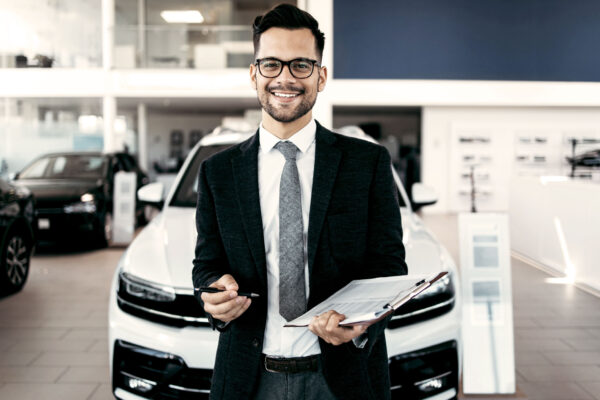Last night, I went to the dealership to pick up my new leased vehicle. I tend to like leasing vehicles because technology changes so quickly. A typical 3-year lease tends to be on the outer limits before the technology is obsolete. Anyhow, my wife and I went to the dealer. I saw my new vehicle right out front ready for me, and I went inside to fill out paperwork. I was immediately struck as to how odd it was that in 2023, I am spending a chunk of time filling out paperwork. For myself who has written a strategic position on D2C and frictionless buying, this seemed like a lot of friction.
The Paperless Agenda Disappears at the Dealership
After filling out some forms with my sales associate, I needed to go see the business manager. Here, it seems like there are two main functions – to upsell me on advanced warranty products and to fill out a lot more paperwork. I noticed that the business manager pulled out a large folder with my name on it. I had to ask if every customer had a folder, and he said that upstairs, there were huge file cabinets filled with these customer folders.
This was astounding to me. As someone with experience helping automotive companies transform their manual labor and outdated systems into streamlined automated processes, this filing system was an absolute miss for frictionless buying and a better customer experience. The experience was like a throwback from before the Internet. Every piece of this process could have been handled online without interrupting the consumer’s busy day.
A Great Sales Experience Can Change Everything
Upon finishing all my paperwork and declining all the add-on products, I walked back to my sales associate. In some odd way, going back to the sales associate was comforting and felt safe. Not certain if that was my own feeling, or by design.
The sales associate took me out to my shiny new vehicle. At that moment, I realized how wonderful this experience was live. My sales associate spent about an hour with me running through each feature and every button of the vehicle. She was especially helpful with the tablet console, making sure I understood exactly how to use the technology. She even took the time to pair my phone and demonstrate how the technology can be used in relation to temperature, entertainment, downloading the mobile app, and erasing my previous vehicle and data.
I was impressed that the entire technology experience was wireless. She even set up music stations and installed my garage opener to my vehicle from the lot. Yes, I could have figured that out with the online instruction, but my salesperson was giving her customer outstanding service. She answered every question and took the time to focus on me and my vehicle. This part of the dealer transformation was handled perfectly. It made me feel confident about my vehicle and the place of purchase. It also made a great impression on the OEM from the customer perspective.
My Problem Really Wasn’t the In-person Dealership Experience
When I took time to reflect, I also realized that my issue was not being at the dealership. I enjoyed the outstanding customer service and product expertise of my sales associate. She knew every feature about the vehicle and was able to share that knowledge. The fact that she was able to teach me all the technology, including downloading apps and how I could make the technology work for my needs, was outstanding.
The other takeaway was that, on my brand-new touchscreen, a message came up from the OEM asking if I would be willing to share all the data generated from the vehicle. This data would be shared with my wife, who also drives a vehicle from this OEM so that the company could continue to provide increased personalization and relevancy in the automotive experience. Data is only going to continue to be something that needs to be categorized, managed, and eventually monetized as we get further into connected vehicle innovation and the Internet of Things.
The Dealership Transformation Doesn’t Have to Be Fully Digital
Overall, my experience with the dealer was a good one. The real issue was my frustration that I had to spend more time at the dealership signing contracts when I could have easily done it online with the right platform. There is a sizable opportunity to provide increased frictionless purchasing, but it would not have to be solved with ecommerce.
I got tremendous value at the dealership that I would hate to miss. There are just aspects of the traditional dealer experience that must be updated and improved to meet the modern consumer’s digital-first expectations. This calls for a digital transformation that would replace all those paper folders, remove the hours spent at the dealership signing paperwork, and produce an even better experience.

